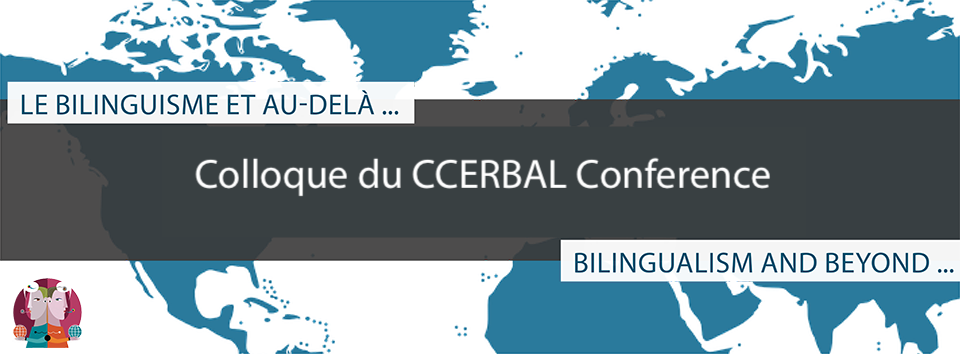The conference is organized by CCERBAL in collaboration with EDiLiC
Bilingualism and Beyond: Advancing the Thinking on Pedagogies, Policies and Practices
PLENARY SESSIONS
Françoise Armand – Université de Montréal
James Cummins – University of Toronto
Onowa McIvor – University of Victoria
Eva Vetter - University of Vienna
CALL FOR PROPOSALS: CLOSED
NOTIFICATIONS OF ACCEPTANCE HAVE BEEN SENT.
A GLOBAL PERSPECTIVE. The world has taken a multilingual turn: an increased awareness that monolingualism is an exception rather than a norm and unprecedented mass migrations have created impetus for continued pedagogical, assessment, policy, and technological innovations to reflect changing global realities. New calls for recognition and specific actions to support diversity, inclusion, equity, and citizenship related to languages have also come to the forefront of global thinking.
THE CANADIAN CONTEXT. In keeping with global trends, Canada has entered a new era in its thinking and actions regarding the role and impact of languages in its complex and diverse social fabric. Continuing to celebrate French-English bilingualism, the Government of Canada has recently launched consultations on modernizing the Official Languages Act and has announced an investment of over $16 million to implement a free learning and maintenance program for French and English. Strong voices for according a new place and offering higher recognition to Indigenous languages have triggered consultations and a subsequent adoption of an Indigenous Languages Act. In addition, close to 23% of Canadians report having a language other than English or French as a mother tongue (Statistics Canada, 2017).
THE CALL.Within this rich and stimulating global and local context, the Canadian Centre for Studies and Research on Bilingualism and Language Planning (CCERBAL) is launching a call for its 2020 Conference. We welcome proposals for individual presentations, posters, symposia, round tables and workshops transcending boundaries and bringing thinking and action to the next level on topics related, but not limited, to the following:
- Language teaching, learning, and assessment
- Language and Technology
- Language policy and family language policy
- Flexible, experiential, community and informal language learning
- Academic literacies, multiliteracies and multimodality
- Languages of schooling, immersion studies, bi-/multilingual education, language intensive programs
- The role of L1(s) or mother tongue(s) in second/additional language teaching
- Inclusion, social justice and equity
- Creation and intersection of third spaces and dialogue between spaces
- Language and migration
- Plurilingualism, multilingualism, translanguaging
- Official languages, Heritage languages, Modern languages, Indigenous languages, Sign languages, Minority languages, ‘Big’ languages vs. ‘Small’ languages
- Languages other than English (LOTE)
Conference dates: April 29 - May 1st, 2021
VENUE: Online - Live and prerecorded presentations
FEATURED EVENTS: Plenary sessions, round tables and thematic symposia, professional development workshops, social activities and more.
CONFERENCE CHAIRS:
Nikolay Slavkov (University of Ottawa), Marie-Paule Lory (University of Toronto Mississauga) and Catherine Levasseur (University of Ottawa).
For more information, please contact us at the following address: ccerbal@uOttawa.ca.
SUBMISSION FORMATS
SUBMISSIONS:
- Online submissions can be in English or French. Presentations at the conference can be in English, in French, or bilingual.
- Please do not submit more than one abstract as a first author.
- Submissions must be anonymous.
- Please note that in order to submit a proposal, you must create an account.
- If you already have an account, please log in.
- Also note that our system is set up to receive plain text pasted directly into the platform. If you must upload graphics or supplementary information in an attached file, please contact us by email for special instructions.
Oral Presentations: 20 minutes for delivery plus 10 minutes for discussion.
Abstract: 300 words.
Posters:
Abstract: 300 words.
Workshops: 60 minutes.
Abstract: 300 words.
Symposia: 120 minutes.
Abstract: introduction/description of the symposium theme (150 words) as well as the presentation abstracts (300 words each) of each speaker as well as the names and affiliations of all speakers (please include them as additional authors during the submission process).
Round tables: 60 minutes.
Abstract: introduction/description of the round table theme (300 words) as well as the names and affiliations of all speakers (please include them as additional authors during the submission process).


